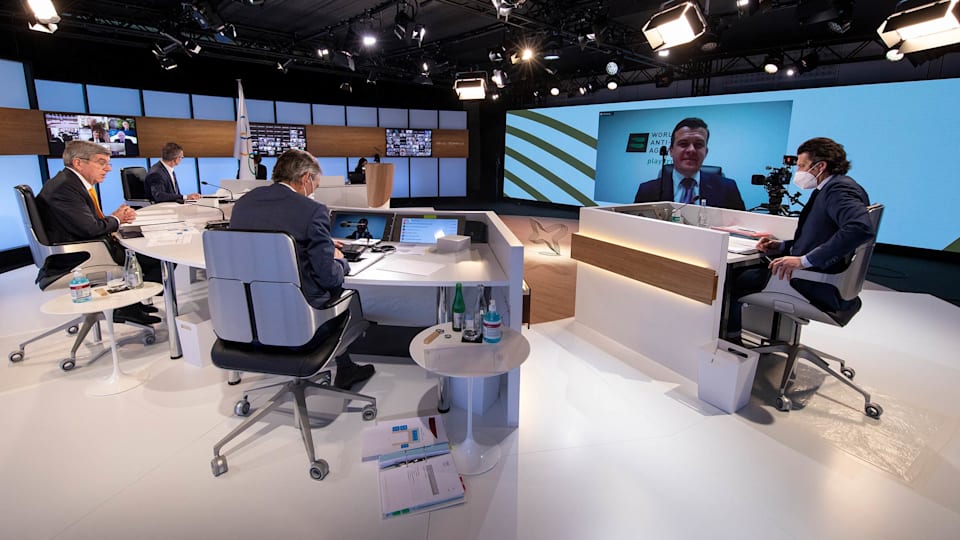Pre-Games anti-doping programme for Tokyo 2020 to be the most extensive ever
The 137th Session of the International Olympic Committee (IOC) today received updates on anti-doping activities from both the World Anti-Doping Agency (WADA) and the International Testing Agency (ITA). The two organisations are working hand in hand to protect clean sport and the integrity of the Olympic Games Tokyo 2020 this summer.

Robust and comprehensive pre-Games anti-doping programme for Tokyo
In her report to the Session, the Chair of the ITA Foundation Board, Dr.Valérie Fourneyron, confirmed that the ITA, working closely with the IOC and the Tokyo 2020 Organising Committee, has built a robust and efficient pre-Games testing programme that will allow athletes to compete in a fair and safe environment in Tokyo
The strength of the programme lies in the fact that the testing assessment period started one year before the Games, allowing to take into account a much wider pool of athletes likely to qualify. Testing recommendations made by the ITA Pre-Games Expert Group aim to close testing gaps ahead of the Games. These recommendations, which amount to more than 26,000, have therefore been issued much earlier (six months ahead of the Games for Tokyo 2020 compared to one month for Rio 2016), and cover more sports (all 33 sports and disciplines for Tokyo compared to seven sports for Rio).
As a result of the recommendations, 2,400 tests on individual athletes and 400 tests on team sports athletes have already been completed by the International Federations (IFs) and National/Regional Anti-Doping Organisations concerned, and more than 6,000 controls are planned in the coming weeks.
In order to further strengthen the programme, the IOC’s testing jurisdiction for the Olympic Games has been extended to allow the ITA to conduct out-of-competition tests two months prior to the start of the Games, hence filling any testing gaps should athletes not be properly tested by the relevant organisation (National Anti-Doping Organisation or IF).
Long-term and free-of-charge storage of samples
The ITA has also implemented a global long-term storage programme to store pre-Games samples in a centralised and secured facility in order to deter athletes from using prohibited substances and allow for the reanalysis of samples for up to 10 years. All Anti-Doping Organisations (ADOs) involved in testing activities for the Olympic Games Tokyo 2020, are encouraged to store their samples on a systematic basis, taking advantage of the IOC’s financial support. Indeed, the IOC has committed to free-of-charge storage in the ITA facility for all samples collected from the athletes who will compete in Tokyo.
The IOC has delegated to the ITA the independent management of the Tokyo 2020 anti-doping programme. Established in 2018, the ITA is an independent body that manages anti-doping programmes for IFs and Major Event Organisations (MEOs).
Concerted efforts
WADA is supporting the work of the Pre-Games Testing Group, and WADA’s President, Witold Bańka, told the IOC Session that the establishment of the long-term sample storage facility and programme also had WADA’s full support as an important and very welcome initiative. In addition to providing assistance for the anti-doping programme that will be coordinated by the ITA during the Games, WADA is also ensuring that the accredited laboratory in Tokyo will be ready for the challenge that awaits it. As in the past, a WADA Independent Observer Programme will be organised in Tokyo to monitor the anti-doping activities at the Games in order to ensure the most effective anti-doping programme is delivered.
Protecting clean sport during COVID-19 pandemic
In his report to the IOC membership, Mr Bańka also stressed that, despite the global impact of the COVID-19 pandemic on the anti-doping system, WADA has kept full oversight of testing activities and put in place relevant guidelines to assist the anti-doping community in these difficult times.
The Agency notably developed, with the input of the World Health Organization (WHO), a document aimed at enabling sample collection in a way that protects the health and safety of athletes, sample collection personnel and others involved in the doping-control process.
In addition, a feasibility study is currently underway to identify alternative and innovative sample-collection programmes and procedures that would maintain the integrity of the process and the samples when dealing with similar crises.
Return to normal levels of sample collection expected in 2021
With regard to testing, a return to normal levels of sample collection is expected in 2021, following the roll-out of vaccination programmes across the globe.
The limited number of sporting competitions that took place in 2020, as well as the restrictions linked to the pandemic, had a considerable impact on the number of samples collected, especially between March and June. However, sample collection, which focused on higher risk sports, was almost back to normal during the second part of the year.
COVID-19 vaccines recommended
With a primary focus on the health of athletes, WADA is strongly recommending vaccines against COVID-19. The Agency has indicated that vaccines are not known to contain any substance or method on the Prohibited List, or to interfere with anti-doping analysis. It will continue to closely monitor the situation and provide timely guidance on this matter.